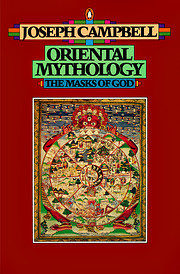

Click on a thumbnail to go to Google Books.
|
Loading... Oriental Mythology (The Masks of God, Volume II) (v. 2) (original 1962; edition 1962)by Joseph Campbell (Author)
Work InformationThe Masks of God: Oriental Mythology by Joseph Campbell (1962)
 No current Talk conversations about this book.  This was another great book by Joseph Campbell. Some parts left me slightly bored, but honestly, that's not a huge deal for me. I think Campbell really analyzed the Eastern mythologies well, although there were a few tinges of a European take on the myths. Despite the occasional European take, Campbell does his best to analyze the myths for what they are for their culture(s). (I may add to this review a little later, but I'm not too worried about it right now.) Make no mistake, the Masks of God series by Joseph Campbell is something fierce. The level of scholarship and devotion to the whole subject of mythology blows me away. Where the first book devoted itself to ancient mythos, the kind we can only infer from lacking sources, this Oriental Mythology tackles time-periods closer to home if not always particularly close. The exceptions to this are Taoism and Buddhism. Both of these are treated in the perfect storytelling-way that the rest are treated. (And no worries, Christianity will get its day with equal time.) This is Campbell, after all. What we get here is Babylonian, Egyptian, Buddhist, Taoist, and a smattering of some others. Did I enjoy the collective treatment and the positioning that showed us, in grand glory, how traditions and stories carry on from one culture to another? Hell, yeah. Did I appreciate the insight and the perspicacity of the author in laying it out in such an obvious and clear-as-day manner? What do you think? Yeah. I'm a fanboy. For good reason. Campbell has reshaped our society in more ways than one. Our whole way of looking at things has changed thanks to him. And no matter what your persuasion, a God Fearing Christian or any other faith, a clear eye is better than none. I can and will thank the man for this. :) Never go blindly. the space given to india versus china, japan is outrageous; and why even include tibet, w the space given to it? this is not to mention the exclusion of so many other literary mythic cultures of (jfc) "the orient" (korea, vietnam, burma, thailand, mongolia being the major ones) do i even have to call this orientalist? given the fucking title? but it is orientalist, just to b clear god the reductionism and stereotyping is HORRIBLE, and all follows the colonial logics laid out by the likes of mircea eliade, jung, and durkheim; ofc, campbell lacks the analytic insight of any competent structuralist I love everything ever penned by Campbell-highly recommend! Like Bettelheim with European fairy tales, Campbell delves into the ways folktales used to act as cautionary illustrations to channel human behavior. This would be morality based on the way society actually functions, not on church teachings about how the world should be. Younger readers may not grasp how fabulous Campbell’s worldview first appeared because now it is so thoroughly believed, used, and imitated. But writers take note: His books are Number One on the syllabus for Hollywood Screenwriting 101. Everyone working in the arts or education—or anyone human—should read Campbell. no reviews | add a review
Belongs to SeriesThe Masks of God (Volume 2) Is contained inIs an expanded version ofNotable Lists
Religion & Spirituality.
Sociology.
Nonfiction.
HTML: Explore the power of myth as it flowered in Asia In this second volume of The Masks of God — Joseph Campbell's major work of comparative mythology — the pre-emimenent mythologist looks at Asian mythology as it developed over the course of five thousand years into the distinctive religions of Egypt, Mesopotamia, India, China, and Japan. The Masks of God is a four-volume study of world religion and myth that stands as one of Joseph Campbell's masterworks. On completing it, he wrote: Its main result for me has been the confirmation of a thought I have long and faithfully entertained: of the unity of the race of man, not only in its biology, but also in its spiritual history, which has everywhere unfolded in the manner of a single symphony, with its themes announced, developed, amplified and turned about, distorted, reasserted, and today, in a grand fortissimo of all sections sounding together, irrestibly advancing to some kind of mighty climax, out of which the next great movement will emerge. This new digital edition, part of the Collected Works of Joseph Campbell series, includes over forty new illustrations. (Comparative Mythology: Ancient Egypt, Hinduism, Buddhism, Jainism) .No library descriptions found. |
Current DiscussionsNonePopular covers
 Google Books — Loading... Google Books — Loading...GenresMelvil Decimal System (DDC)291.13Religion Other religions [Unassigned] Mythologies Archetypal MythologyLC ClassificationRatingAverage: (4.13) (4.13)
Is this you?Become a LibraryThing Author. |
||||||||||||||||||||||||||||||||||||||||||||||||||||||||||||||||||||||||||||||||||||||||||||||||||||||||||||||||||||||||||||||||||||||||